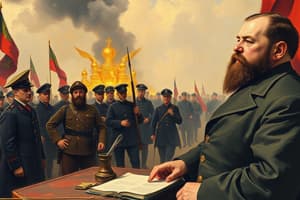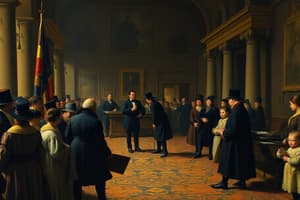Podcast
Questions and Answers
What percentage of Russia's land was used for farming in 1900?
What percentage of Russia's land was used for farming in 1900?
- 5% (correct)
- 50%
- 10%
- 25%
The majority of the Tsar’s subjects in 1900 were Russians.
The majority of the Tsar’s subjects in 1900 were Russians.
False (B)
What major railway was being constructed to improve trade in Russia?
What major railway was being constructed to improve trade in Russia?
Trans-Siberian Railway
In 1900, the __________ was a cold land covered with pine trees in Russia.
In 1900, the __________ was a cold land covered with pine trees in Russia.
Match the following peoples with their populations in 1900:
Match the following peoples with their populations in 1900:
What factor greatly affected industry and commerce in Russia during this period?
What factor greatly affected industry and commerce in Russia during this period?
Who was the Tsar of Russia in 1900?
Who was the Tsar of Russia in 1900?
Sea and river trade in Russia were possible all year round by 1900.
Sea and river trade in Russia were possible all year round by 1900.
What percentage of the Russian Empire's citizens were peasants in 1900?
What percentage of the Russian Empire's citizens were peasants in 1900?
All Russian peasants owned their own land after being freed from serfdom.
All Russian peasants owned their own land after being freed from serfdom.
Who freed the Russian peasants from serfdom?
Who freed the Russian peasants from serfdom?
The average life expectancy of Russian peasants who reached the age of five was only __________ years.
The average life expectancy of Russian peasants who reached the age of five was only __________ years.
What was a common reason for factory workers to work overtime?
What was a common reason for factory workers to work overtime?
Peasants had to pay redemption payments for their land over __________ years.
Peasants had to pay redemption payments for their land over __________ years.
Trade unions were allowed by law for Russian workers in 1900.
Trade unions were allowed by law for Russian workers in 1900.
Match the following groups with their descriptions:
Match the following groups with their descriptions:
What nickname did Russians give to the gallows in 1906?
What nickname did Russians give to the gallows in 1906?
Terrorism was a significant threat to the autocracy before 1906.
Terrorism was a significant threat to the autocracy before 1906.
What major action did Stolypin take concerning peasant land ownership?
What major action did Stolypin take concerning peasant land ownership?
In 1906, _______ people were exiled to Siberia.
In 1906, _______ people were exiled to Siberia.
What did Nicholas rename St Petersburg to during World War I?
What did Nicholas rename St Petersburg to during World War I?
Who was Gregory Efimovitch?
Who was Gregory Efimovitch?
Match the following events with the year they occurred:
Match the following events with the year they occurred:
Rasputin was involved with the royal family due to his healing abilities.
Rasputin was involved with the royal family due to his healing abilities.
Flashcards
Russia's size in 1900
Russia's size in 1900
Vast empire, encompassing diverse climates and regions, from tundra to farmland, affecting industry, trade, and agriculture.
Russian population demographics (1900)
Russian population demographics (1900)
Diverse ethnic population, not a majority of Russians, with various nationalities and ethnic groups.
Tsar's rule in 1900
Tsar's rule in 1900
Emperor of Russia, ruling over a large empire with many ethnic groups.
Limited Russian farmland (1900)
Limited Russian farmland (1900)
Signup and view all the flashcards
Challenges of Russian climate (1900)
Challenges of Russian climate (1900)
Signup and view all the flashcards
Trans-Siberian Railway (1900)
Trans-Siberian Railway (1900)
Signup and view all the flashcards
Non-Russian majority
Non-Russian majority
Signup and view all the flashcards
Ethnic diversity in Russia
Ethnic diversity in Russia
Signup and view all the flashcards
Russian Peasants in 1900
Russian Peasants in 1900
Signup and view all the flashcards
Serfdom before 1861
Serfdom before 1861
Signup and view all the flashcards
1861 Peasant Emancipation
1861 Peasant Emancipation
Signup and view all the flashcards
Land ownership in Mir
Land ownership in Mir
Signup and view all the flashcards
Redemption Payments
Redemption Payments
Signup and view all the flashcards
Factory Workers Condition (Quote)
Factory Workers Condition (Quote)
Signup and view all the flashcards
Russian Social Class Structure
Russian Social Class Structure
Signup and view all the flashcards
1900 Russian Large City
1900 Russian Large City
Signup and view all the flashcards
Stolypin's reforms
Stolypin's reforms
Signup and view all the flashcards
Stolypin's Necktie
Stolypin's Necktie
Signup and view all the flashcards
Russo-Japanese War
Russo-Japanese War
Signup and view all the flashcards
Rasputin's influence
Rasputin's influence
Signup and view all the flashcards
1914 Russian mobilization
1914 Russian mobilization
Signup and view all the flashcards
Early Russian defeats (WWI)
Early Russian defeats (WWI)
Signup and view all the flashcards
Petrograd
Petrograd
Signup and view all the flashcards
Haemophilia
Haemophilia
Signup and view all the flashcards
Study Notes
Book Overview
- The book is titled "Russia in War and Revolution, Russia 1900-24"
- Authored by Josh Brooman
- Published by Longman
- Divided into three parts:
- Part One: Russia under the Tsar
- Part Two: War and Revolution
- Part Three: Lenin's Russia
- Provides a detailed account of Russian history from 1900 to 1924, covering events leading up to and through the Russian Revolution.
- Includes a variety of primary source materials, images, and maps.
- Features active learning elements, revision guides, and exercises in each chapter to aid student comprehension.
Russia in 1900
- Russia had a large population (around 125 million people in 1900)
- Around half of the population consisted of non-Russians (e.g., Ukrainians, Poles)
- Majority of the population were peasants living in rural areas
- Land was unevenly distributed, with nobles owning large tracts of land and small plots for peasants in villages
- Russia experienced a harsh climate and vast areas of unusable land
- Transportation and infrastructure were underdeveloped, hindering economic activity
- Russia faced challenges administering such a diverse and vast empire
- Majority of the population were poor and impoverished
- The Tsarist government faced significant opposition and unrest
- The Tsar had almost absolute power, making decisions without parliamentary input
- The book highlights Russia's extensive landmass with cold climates, posing challenges for agriculture and transportation
- A significant portion of the population lived in poor conditions, contributing to widespread discontent.
Studying That Suits You
Use AI to generate personalized quizzes and flashcards to suit your learning preferences.
Related Documents
Description
Explore the intricate history of Russia from 1900 to 1924 as detailed in 'Russia in War and Revolution' by Josh Brooman. This quiz covers key themes such as Tsarist rule, the impact of World War I, and the emergence of Lenin's Russia. Engage with primary sources and active learning elements to deepen your understanding of this pivotal period.




